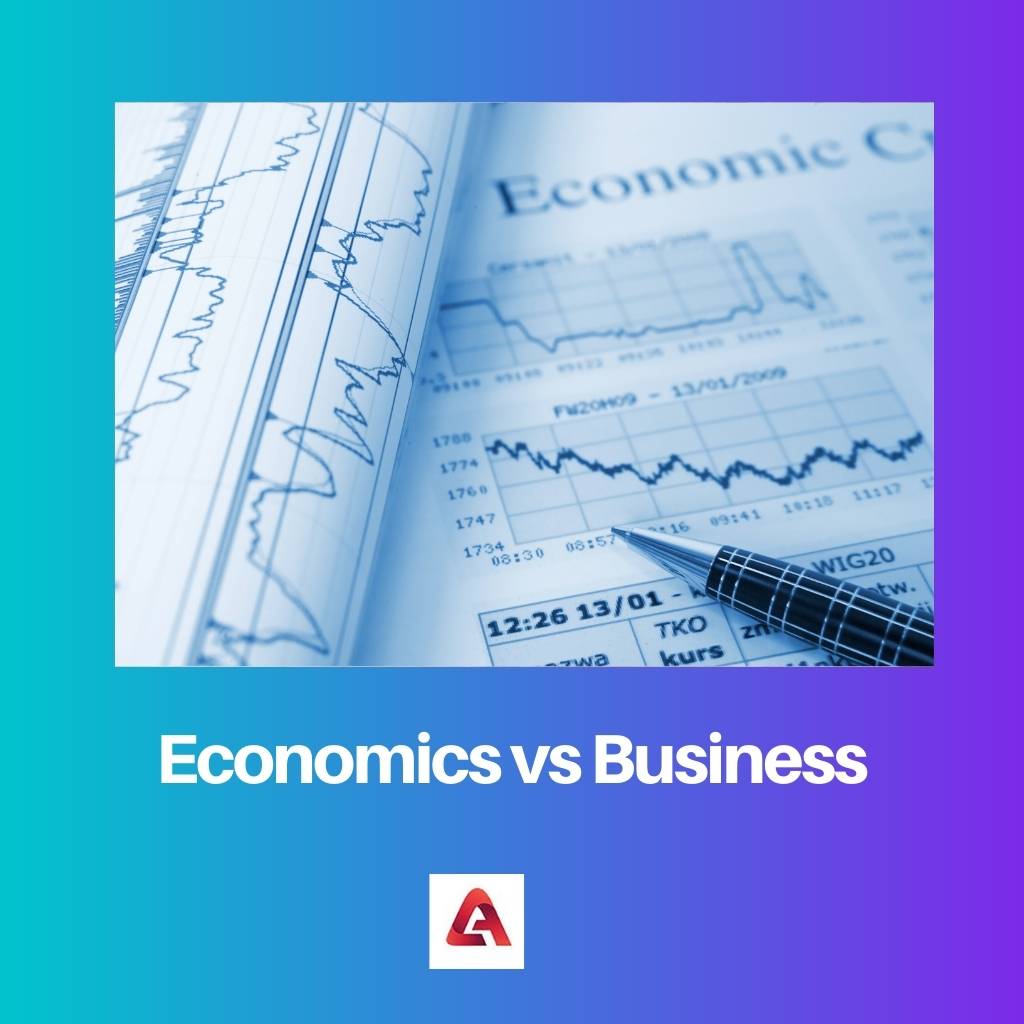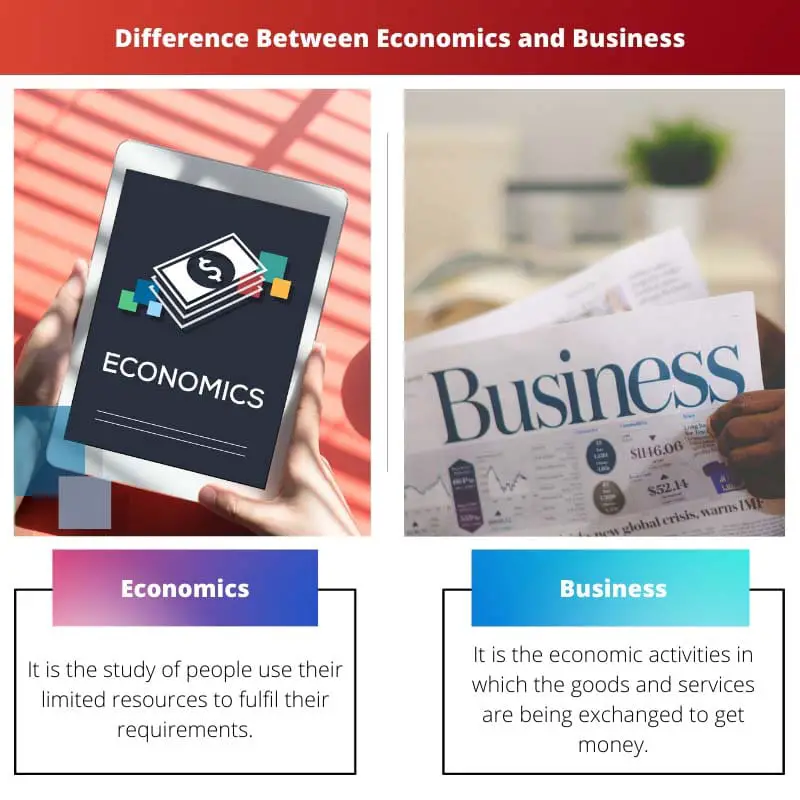Economics focuses on understanding the broader principles governing production, consumption, and distribution of goods and services within societies, emphasizing theories like supply and demand, market structures, and macroeconomic factors. Business, on the other hand, is more application-oriented, dealing with the practical aspects of managing organizations, including strategic decision-making, operations, marketing, finance, and human resources to achieve specific objectives and maximize profit or achieve organizational goals.
Key Takeaways
- Economics studies the production, consumption, and distribution of goods and services, while business is the application of economic principles.
- Economics focuses on macro-level policies that affect the economy as a whole, while business is concerned with micro-level decision-making.
- Economics aims to maximize social welfare, whereas business aims to maximize stakeholder profits.
Economics vs Business
Economics is the social science that deals with producing, distributing, and consuming goods and services. Business refers to the activities involved in producing and exchanging goods and services for profit and focuses on specific industries, firms, and markets.

Comparison Table
| Feature | Economics | Business |
|---|---|---|
| Focus | Understanding human behavior in relation to scarce resources and their allocation | Applying economic principles to manage and operate an organization for profit |
| Scope | Wider view: Analyzes how individuals, firms, and governments make decisions and interact within the entire economic system | Narrower view: Focuses on specific organizations and their activities within a particular market |
| Methodology | Uses theoretical models, statistical analysis, and historical data to understand trends and predict outcomes | Uses case studies, financial analysis, and practical applications to solve problems and make decisions |
| Key Concepts | Supply and demand, market equilibrium, efficiency, economic growth, unemployment, inflation, monetary policy, fiscal policy | Marketing, management, accounting, finance, human resources, operations, logistics, entrepreneurship |
| Career Paths | Economist, economic analyst, policy analyst, researcher, professor | Entrepreneur, business manager, marketing manager, accountant, financial analyst, consultant |
| Main Skills | Analytical thinking, problem-solving, quantitative skills, communication skills, research skills | Leadership, communication, organizational skills, decision-making, creativity, teamwork, problem-solving |
What is Economics?
Economics is a social science that examines how individuals, businesses, governments, and societies allocate scarce resources to satisfy unlimited wants and needs. It encompasses the study of production, consumption, and distribution of goods and services, as well as the factors influencing these activities.
Core Concepts in Economics
1. Scarcity and Choice At the heart of economics lies the concept of scarcity, where unlimited human wants and needs exceed the finite resources available to fulfill them. This scarcity necessitates choices about how resources are allocated, leading to trade-offs and opportunity costs. Individuals, firms, and governments must make decisions about what to produce, how to produce it, and for whom, given these constraints.
2. Supply and Demand Supply and demand are fundamental concepts in economics that determine prices and quantities in markets. The law of demand states that as the price of a good or service decreases, quantity demanded increases, ceteris paribus, and vice versa. Conversely, the law of supply asserts that as the price of a good or service increases, quantity supplied increases, ceteris paribus, and vice versa. Equilibrium is achieved when supply equals demand, setting the market price and quantity exchanged.
3. Market Structures Economists study different market structures, ranging from perfect competition to monopoly, to understand how prices and outputs are determined and how firms behave in these environments. Perfect competition features many small firms producing identical products, with no individual firm having the power to influence market prices. Monopoly, on the other hand, involves a single seller dominating the market, allowing them to set prices without fear of competition.
4. Macroeconomics and Microeconomics Macroeconomics examines the economy as a whole, focusing on aggregates such as national income, employment, inflation, and economic growth. It analyzes the interactions between different sectors of the economy and the role of government policies in influencing economic outcomes. Microeconomics, meanwhile, studies the behavior of individual agents, such as consumers and firms, and how their decisions impact markets. It delves into topics like consumer choice, production, costs, and market structures.

What is Business?
Business refers to the organized effort of individuals or groups to produce and sell goods and services for profit. It encompasses various activities, including production, marketing, finance, and management, aimed at achieving specific objectives such as maximizing shareholder value, serving customers’ needs, or fulfilling societal demands.
Core Concepts in Business
1. Entrepreneurship and Innovation Entrepreneurship is a central aspect of business, involving the identification and exploitation of opportunities to create new products, services, or processes. Entrepreneurs take on risks in pursuit of rewards, driving innovation and economic growth. They initiate and manage businesses, navigating challenges such as market competition, regulatory compliance, and financial constraints.
2. Operations and Production Operations management focuses on designing, planning, and controlling the processes that transform inputs (e.g., raw materials, labor, capital) into outputs (e.g., goods, services). It involves optimizing efficiency, quality, and cost-effectiveness throughout the production cycle, from sourcing raw materials to delivering final products to customers.
3. Marketing and Sales Marketing plays a crucial role in business by identifying customer needs and preferences, developing products or services to satisfy them, and promoting these offerings to target markets. It encompasses market research, product development, pricing strategies, distribution channels, and advertising campaigns to attract and retain customers and build brand loyalty.
4. Finance and Accounting Finance and accounting are essential functions in business, involving the management of financial resources and the recording, analysis, and reporting of financial transactions. Financial management entails decisions regarding investment, financing, and dividend policies to optimize the allocation and utilization of funds, maximize profitability, and ensure long-term sustainability.

Main Differences Between Economics and Business
- Focus:
- Economics primarily focuses on understanding the broader principles governing production, consumption, and distribution of goods and services within societies.
- Business is more application-oriented, concentrating on practical aspects of managing organizations to achieve specific objectives such as profit maximization or organizational growth.
- Scope:
- Economics encompasses theoretical frameworks and analytical tools to explain economic phenomena, including microeconomic concepts like supply and demand, market structures, and macroeconomic factors like inflation, unemployment, and economic growth.
- Business covers a wide range of activities related to entrepreneurship, operations, marketing, finance, and management within organizations, emphasizing practical strategies for creating value, satisfying customer needs, and achieving organizational goals.
- Approach:
- Economics adopts a scientific approach, employing theories, models, and empirical analysis to understand economic behavior, predict outcomes, and inform policy decisions.
- Business takes a pragmatic approach, focusing on practical solutions to real-world challenges, such as optimizing production processes, developing marketing strategies, managing finances, and leading teams effectively.

- https://proformas.ljmu.ac.uk/4001BUSHN.pdf
- https://books.google.com/books?hl=en&lr=&id=zwPSLEFLwmkC&oi=fnd&pg=PR12&dq=Economics+and+Business&ots=lPtvIDwWSV&sig=JG8sZOe7kTWBLkHUj9xl4UZCyCk

The comprehensive explanation of different types of economics and businesses provides significant clarity. A well-researched and highly informative article.
I couldn’t agree more. The depth of information in this article is truly impressive.
Spot on. The level of detail and the insightful comparison is truly commendable.
The comparison table is extremely useful for understanding the respective focuses of economics and business on issues and stakeholders. Great clarity in this article.
I concur! The concise yet informative nature of the post makes it an excellent resource for anyone looking to grasp these concepts.
I couldn’t have said it better myself. The detailed comparison provides a clear distinction between economics and business.
The article effectively presents an in-depth understanding of economics and business, offering valuable insights into the topic. Excellent work.
Couldn’t agree more. The level of detail and clarity in this article makes it an indispensable resource for those wanting to comprehend these concepts.
The detailed description of the types of economics and the different types of businesses helps in understanding these complex concepts effectively. A valuable read.
Couldn’t have said it better. The vast coverage of economics and business in this article is highly beneficial.
The breakdown of what economics encompasses and the detailed explanation on different types of businesses offers a comprehensive understanding of the subject matter. Great read.
I concur. The article goes beyond surface-level explanations, providing a detailed insight into economics and business.
Absolutely. The depth of knowledge and the clarity in the information are truly noteworthy.
The post does an outstanding job of explaining the concepts and distinctions between economics and business, leaving no room for ambiguity. Exceptionally well-crafted article.
I couldn’t agree more. The thoroughness of the content makes it an invaluable source of information.
Absolutely. The articulation of complex concepts in such a clear and succinct manner makes it an excellent resource.
The section on ‘What is Business?’ provides a detailed explanation on the various types of businesses, making it a valuable resource for those seeking knowledge in this area.
I agree. The articulation of the key concepts and types of business is impressive.
Absolutely. The breakdown of different types of businesses is especially insightful and sets this article apart.
I appreciate the concise yet thorough explanation of pure and applied economics, and the detailed description of what business entails. Well-written and informative.
Agreed. The explanation is clear and detailed, offering valuable insights into economics and business.
A great explanation of the difference between economics and business! Thanks for the detailed breakdown of the key takeaways.
Couldn’t agree more! The comparison table on the parameters of economics and business really helps to differentiate the two.
The post provides a comprehensive understanding of how economics and business correspond. The detailed explanation on micro and macroeconomics is highly informative.
Absolutely, the breakdown of pure and applied economics and the types of businesses is very helpful in understanding the concepts.